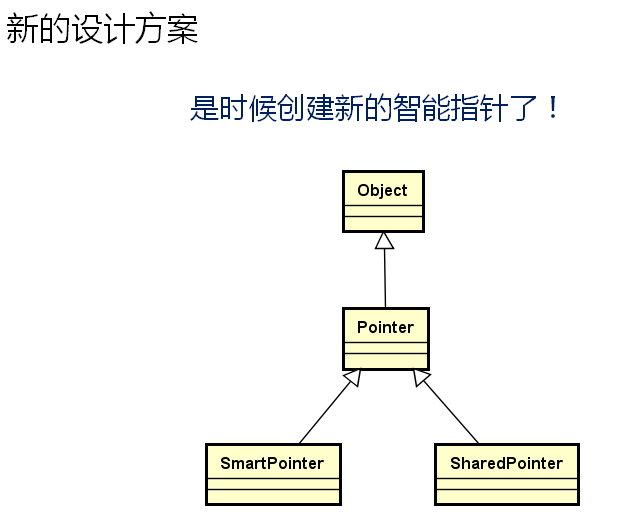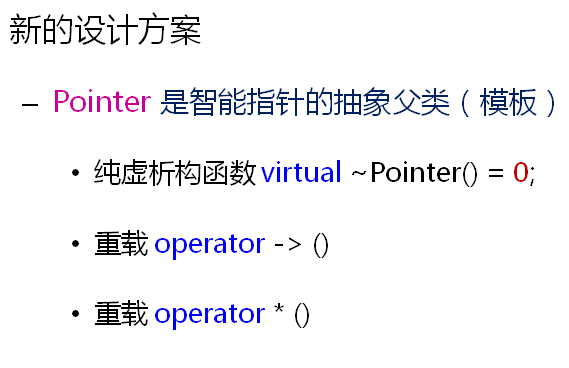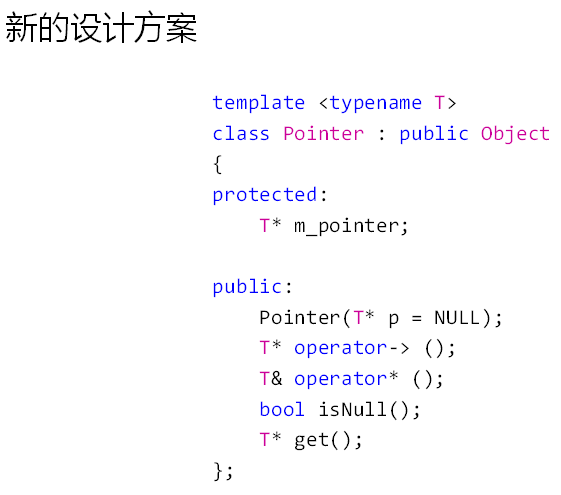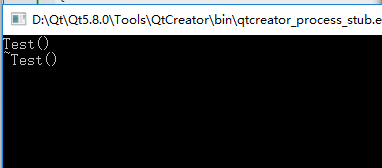思考:
使用智能指针替换单链表LinkLIst中的原生指针是否可行?
将LinkList.h中的Node指针全部改成智能指针:
1 #ifndef LINKLIST_H 2 #define LINKLIST_H 3 4 #include "List.h" 5 #include "Exception.h" 6 #include "SmartPointer.h" 7 8 namespace DTLib 9 { 10 11 template < typename T > 12 class LinkList : public List<T> 13 { 14 protected: 15 struct Node : public Object 16 { 17 T value; 18 SmartPointer<Node> next; 19 }; 20 21 mutable struct : public Object 22 { 23 char reserved[sizeof(T)]; 24 SmartPointer<Node> next; 25 }m_header; 26 27 int m_length; 28 int m_step; 29 SmartPointer<Node> m_current; 30 31 Node* position(int i) const // O(n) 32 { 33 //Node* ret = reinterpret_cast<Node*>(&m_header); 34 SmartPointer<Node> ret = reinterpret_cast<Node*>(&m_header); 35 36 for(int p = 0; p < i; p++) 37 { 38 ret = ret->next; 39 } 40 41 return ret.get(); 42 } 43 44 virtual Node* create() 45 { 46 return new Node(); 47 } 48 49 virtual void destroy(Node* pn) 50 { 51 delete pn; 52 } 53 54 public: 55 LinkList() 56 { 57 m_header.next = NULL; 58 m_length = 0; 59 m_step = 1; 60 m_current = NULL; 61 } 62 63 bool insert(const T& e) 64 { 65 return insert(m_length, e); 66 } 67 68 bool insert(int i, const T& e) // O(n) 69 { 70 bool ret = ((0 <= i) && (i <= m_length)); 71 72 if( ret ) 73 { 74 Node* node = create(); 75 76 if( node != NULL ) 77 { 78 Node* current = position(i); 79 80 node->value = e; 81 node->next = current->next; 82 current->next = node; 83 84 m_length++; 85 } 86 else 87 { 88 THROW_EXCEPTION(NoEnoughMemoryException, "No memery to insert new element..."); 89 } 90 } 91 92 return ret; 93 } 94 95 bool remove(int i) // O(n) 96 { 97 bool ret = ((0 <= i) && (i < m_length)); 98 99 if( ret ) 100 { 101 SmartPointer<Node> current = position(i); 102 103 SmartPointer<Node> toDel = current->next; 104 105 if( m_current == toDel ) 106 { 107 m_current = toDel->next; 108 } 109 110 current->next = toDel->next; 111 112 m_length--; 113 114 // destroy(toDel); 115 116 } 117 118 return ret; 119 } 120 121 bool set(int i, const T& e) // O(n) 122 { 123 bool ret = ((0 <= i) && (i < m_length)); 124 125 if( ret ) 126 { 127 position(i)->next->value = e; 128 } 129 130 return ret; 131 } 132 133 T get(int i) const 134 { 135 T ret; 136 137 if( get(i, ret) ) 138 { 139 return ret; 140 } 141 else 142 { 143 THROW_EXCEPTION(IndexOutOfBoundsException, "Invalid parameter i to get element ..."); 144 } 145 146 return ret; 147 } 148 149 bool get(int i, T& e) const // O(n) 150 { 151 bool ret = ((0 <= i) && (i < m_length)); 152 153 if( ret ) 154 { 155 e = position(i)->next->value; 156 } 157 158 return ret; 159 } 160 161 int find(const T& e) const // O(n) 162 { 163 int ret = -1; 164 int i = 0; 165 166 SmartPointer<Node> node = m_header.next; 167 168 //while( node ) 169 while( node.isNull() ) 170 { 171 if( node->value == e ) 172 { 173 ret = i; 174 break; 175 } 176 else 177 { 178 node = node->next; 179 i++; 180 } 181 } 182 183 return ret; 184 } 185 186 int length() const // O(1) 187 { 188 return m_length; 189 } 190 191 void clear() // O(n) 192 { 193 //while( m_header.next ) 194 while( m_header.next.isNull() ) 195 { 196 //Node* toDel = m_header.next; 197 SmartPointer<Node> toDel = m_header.next; 198 199 m_header.next = toDel->next; 200 201 m_length--; 202 203 // destroy(toDel); 204 } 205 206 // m_length = 0; 207 } 208 209 bool move(int i, int step = 1) 210 { 211 bool ret = (0 <= i) && (i < m_length) && (step > 0); 212 213 if( ret ) 214 { 215 m_current = position(i)->next; 216 m_step = step; 217 } 218 219 return ret; 220 } 221 222 bool end() 223 { 224 //return (m_current == NULL); 225 return m_current.isNull(); 226 } 227 228 T current() 229 { 230 if( !end() ) 231 { 232 return m_current->value; 233 } 234 else 235 { 236 THROW_EXCEPTION(InvalidOperationException, "No value at current position ..."); 237 } 238 } 239 240 bool next() //每次移动step步 241 { 242 int i = 0; 243 244 while((i < m_step) && !end()) 245 { 246 m_current = m_current->next; 247 i++; 248 } 249 250 return (i == m_step); 251 } 252 253 ~LinkList() // O(n) 254 { 255 clear(); 256 } 257 }; 258 259 } 260 261 #endif // LINKLIST_H
测试程序如下:
1 #include <iostream> 2 #include "LinkList.h" 3 4 using namespace std; 5 using namespace DTLib; 6 7 8 int main() 9 { 10 LinkList<int> list; 11 12 for(int i = 0; i < list.length(); i++) 13 { 14 list.insert(i); 15 } 16 17 for(list.move(0); !list.end(); list.next()) 18 { 19 cout << list.current() << endl; 20 } 21 22 return 0; 23 }
运行结果如下:

程序直接崩溃了。

我们的SmartPointer设计中,一片堆空间最多只能由一个指针标识,但是我们设计的和遍历有关的函数,例如move、end、current、next,在遍历时一片堆空间会由多个指针指向,所以程序崩溃了。
改进方案:

我们需要创建一个中间类pointer,并且它还有两个子类。
SharedPointer支持一片堆空间由多个指针指向,也支持自动释放。
在设计上做了改动,所以SmartPointer也得做改动。

pointer类中的析构函数是纯虚函数,因为pointer是一个抽象父类,需要由子类继承才能生成对象。

Object的析构函数就是纯虚的,所以pointer中就没有必要再写一遍了。
只要pointer没有实现自己的析构函数,那么它就还是一个抽象类。
添加Pointer.h文件,内容如下:
1 #ifndef POINTER_H 2 #define POINTER_H 3 4 #include "Object.h" 5 6 namespace DTLib 7 { 8 9 template < typename T > 10 class Pointer : public Object 11 { 12 protected: 13 T* m_pointer; 14 15 public: 16 Pointer(T* p = NULL) 17 { 18 m_pointer = p; 19 } 20 21 T* operator->() 22 { 23 return m_pointer; 24 } 25 26 T& operator* () 27 { 28 return *m_pointer; 29 } 30 31 bool isNull() 32 { 33 return (m_pointer == NULL); 34 } 35 36 T* get() 37 { 38 return m_pointer; 39 } 40 41 // 不需要析构函数,这里继承自Object,只要不实现具体的析构函数,这个类就是抽象类 42 }; 43 44 } 45 46 #endif // POINTER_H
SmartPointer.h的内容更改如下:
1 #ifndef SMARTPOINTER_H 2 #define SMARTPOINTER_H 3 4 #include "Pointer.h" 5 6 namespace DTLib 7 { 8 9 template <typename T> 10 class SmartPointer : public Pointer<T> 11 { 12 public: 13 SmartPointer(T *p = NULL) : Pointer<T>(p) 14 { 15 16 } 17 18 SmartPointer(const SmartPointer<T>& obj) 19 { 20 this->m_pointer = obj.m_pointer; 21 22 const_cast<SmartPointer<T>&>(obj).m_pointer = NULL; 23 } 24 25 SmartPointer<T>& operator= (const SmartPointer<T>& obj) 26 { 27 if(this != &obj) 28 { 29 T* p = this->m_pointer; 30 31 this->m_pointer = obj.m_pointer; 32 33 const_cast<SmartPointer<T>&>(obj).m_pointer = NULL; 34 35 delete p; 36 } 37 38 return *this; 39 } 40 41 ~SmartPointer() // 肯定需要这个析构函数,否则还是抽象类 42 { 43 delete this->m_pointer; 44 } 45 }; 46 47 } 48 49 #endif // SMARTPOINTER_H
第25-36行的赋值操作符改成了异常安全的,将delete操作放到了最后。
SmartPointer.h中删掉了一些重载函数,放到了Pointer.h中,SmartPointer继承自Pointer。
测试程序如下:
1 #include <iostream> 2 #include "SmartPointer.h" 3 4 using namespace std; 5 using namespace DTLib; 6 7 8 class Test : public Object 9 { 10 public: 11 Test() 12 { 13 cout << "Test()" << endl; 14 } 15 16 ~Test() 17 { 18 cout << "~Test()" << endl; 19 } 20 }; 21 22 int main() 23 { 24 SmartPointer<Test> sp = new Test(); 25 26 return 0; 27 }
结果如下:

可以看到自动调用了Test的析构函数。
思考:




